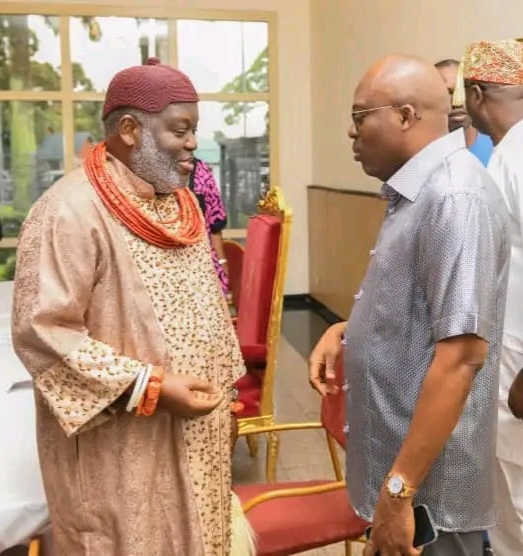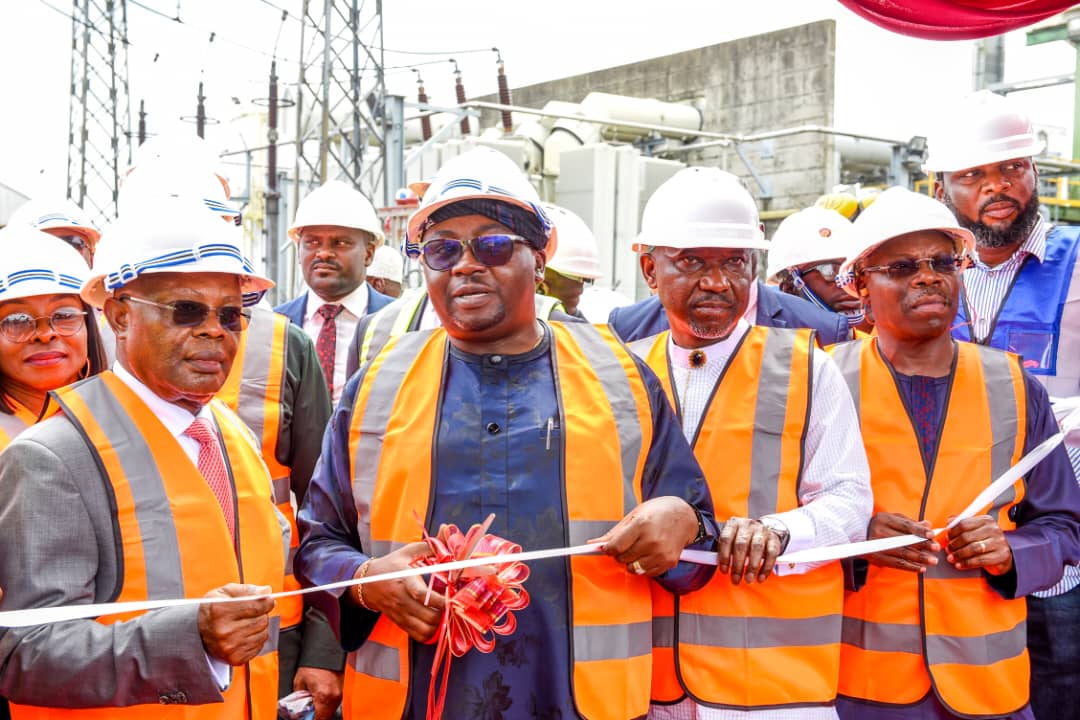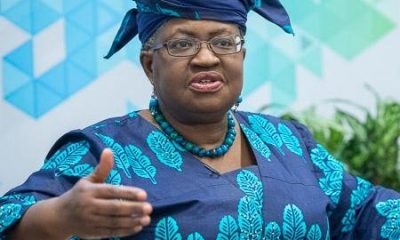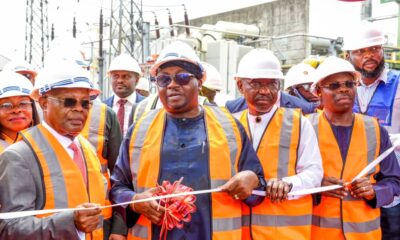Featured
Tinubu Assigns Portfolios To Wike, 44 Others …To Swear In Ministers, Monday

President Bola Tinubu will next Monday swear in 45 ministers he assigned portfolios on Wednesday night.
Secretary to the Government of the Federation (SGF), Senator George Akume, disclosed this in a statement late Wednesday in Abuja.
The event is billed to hold at the State House Conference Centre, Aso villa in Abuja by 10 am.
A statement by the Director, Information, Office of the Secretary to the Government of the Federation, Willie Bassey, said the ministers are allowed to come with two guests each.
The statement also contained the 45 ministers and their portfolios.
While the immediate past governor of Rivers State, Chief Nyesom Wike, was assigned to the Federal Capital Territory ((FCT) as minister, his Ebonyi State counterpart, David Umahi, was made Minister of Works, and former governor of Osun State, Adegboyega Oyetola as Minister of Transportation.
Revered economist and financial expert, Wale Edun who has, since the beginning of Tinubu’s administration on May 29, served as economic adviser, would serve as Minister of Finance and Coordinating Minister of the Economy, while Adebayo Adelabu supervises the Ministry of Power as minister.
Contrary to predictions of many pundits that Dele Alake who has been the President’s spokesperson would serve in the same capacity as Minister of Information and National Orientation, a veteran journalist and publisher of Blueprint Newspapers, Muhammed Idris, was deployed to the ministry while Alake was assigned as Minister of Solid Minerals Development.
Expectedly, prominent lawyer and Tinubu’s legal adviser, Lateef Fagbemi, SAN, was made Attorney General of the Federation and Minister of Justice.
The President created a few new ministries such as the Ministry of Marine and Blue Economy with Bunmi Tunji-Ojo as minister; Ministry of Art, Culture and the Creative Economy with Hannatu Musawa as minister.
Tinubu also split the Ministry of Petroleum and Gas Resources into two with Heineken Lokpobiri serving as Minister of State, Petroleum Resources; and Ekperipe Ekpo as Minister of State, Gas Resources.
The Presidency also separated the Ministry of Sports Development from Youth, unlike what it was under previous administrations.
While John Enoh serves as Minister of Sports Development, a former member of the House of Representatives for Etsako, Abubakar Momoh, who is from Edo State, now heads the new Ministry of Youth.
Other ministers-designate that were assigned portfolios last Wednesday include former Governor of Jigawa State, Mohammed Badaru as Defence Minister; former Governor of Zamfara State, Bello Matawalle, Minister of State for Defence; Tahir Maman, Minister of Education; Yusuf Sununu, Minister of State for Education; Ahmed Dangiwa, Minister of Housing & Urban Development; Abdullahi Gwarzo, Minister of State, Housing & Urban Development, while Mairiga Mahmud serves as Minister of State, Federal Capital Territory.
Also assigned portfolios are former Governor of Kebbi State, Atiku Bagudu as Minister of Budget & Economic Planning; Ishak Salako, Minister of State, Environment and Ecological Management; Joseph Utsev, Minister of Water Resources and Sanitation; Bello Goronyo, Minister of State, Water Resources and Sanitation; Abubakar Kyari, Minister of Agriculture and Food Security; Aliyu Abdullahi, Minister of State, Agriculture, and Food Security; Saidu Alkali, Minister of Interior; and Yusuf Tuggar as Minister of Foreign Affairs.
Professor Ali Pate will serve as Coordinating Minister of Health and Social Welfare; Tunji Alausa, Minister of State, Health and Social Welfare; Ibrahim Geidam, Minister of Police Affair; Imaam Sulaiman-Ibrahim, Minister of State, Police Affairs; Shuaibu Audu, Minister of Steel Development; U. Maigari Ahmadu, Minister of State, Steel Development; Zephaniah Jisalo, Minister of Special Duties and Inter-Governmental Affairs; and Bosun Tijani as Minister of Communications, Innovation and Digital Economy.
Former governor of Plateau State and Director-General of the APC Presidential Campaign Council in the last general elections, Simon Lalong, will serve as Minister of Labour and Employment; Nkiruka Onyejeocha, Minister of State, Labour and Employment; Lola Ade-John, Minister of Tourism; Doris Anite, Minister of Industry, Trade and Investment; and Uche Nnaji as Minister of Innovation, Science and Technology.
Other ministers to be sworn in next Monday are APC’s campaign spokesperson in the last general elections, Festus Keyamo as Minister of Aviation and Aerospace Development; Betta Edu, Minister of Humanitarian Affairs and Poverty Alleviation; and Uju Kennedy as Minister of Women Affairs.
Meanwhile, none of the 45 ministers-designate was assigned to the Ministry of Niger Delta, just as there is no substantive Minister of Environment yet.
The Tide also observed that the President may have toed former President Muhammadu Buhari’s path by assigning to himself Minister of Petroleum and Gas Resources.
By: Boye Salau
Featured
Tinubu Commissions Afam 11 Power Plant …Urges Stronger Private Sector Partnership In Power Sector

President Bola Tinubu has restated the commitment of the Federal Government towards achieving sustainable electricity supply and industrialisation in Nigeria.
Tinubu gave the declaration during the commissioning of the newly constructed 180 megawatts Afam 11 Power Plant located in Afam, Oyigbo Local Government Area in Rivers State on Wednesday.
He said the completion of the project within just 16 months was a key achievement in the power sector.
The President who addressed Nigerians virtually during the event, emphasized that the project, which is a landmark partnership between Crescendough Nigeria Limited (CNL) and Sahara Power Group, underscored the tenacity of his administration to promote success in private sector partnership and development, adding that the feat will increase industrialisation and economic growth in the country.
The president commended the Rivers State Government, the contractors, Sahara Energies and Crescendough Nigeria Limited (CNL) for the successful delivery of the project on record time.
While urging stronger collaboration among stakeholders to achieve a more globally competitive Nigeria, Tinubu said achieving sustainable power supply remains an unwavering goal under his administration
The President described the project as a testament to the blossoming investment opportunities fostered by his administration’s well-structured policies, which prioritize national development and private sector participation.
He emphasized that the Afam II Plant will not only bolster Nigeria’s power generation capacity by adding 180MW to the national grid but also energize businesses, industries, healthcare facilities, and households, igniting hope for a brighter economic future.
“The completion of the Afam II Plant within just 16 months reinforces our capacity to overcome challenges through collaboration, tenacity, and unwavering commitment under the Renewed Hope Agenda,” President Tinubu stated. “Achieving stable power supply remains a top priority for this administration. I have directed the Honourable Minister of Power and all stakeholders in the power value chain to work collectively towards our declaration to light up Nigeria.”
“We solicit the support of all Nigerians as we implement reforms and strategies to transform the power sector. Our administration will continue to enforce policies that attract investments—both local and foreign—to achieve this critical goal,” he affirmed.
In his remarks, the Administrator of Rivers State, Vice Admiral Ibok-Ete Ibas (Rtd), hailed the project as a product of visionary leadership and private sector empowerment.
He noted that President Tinubu’s enabling policies have spurred bold investments across key sectors, including power, agriculture, oil and gas, education, and transportation.
“This power plant reflects the long-standing vision of successive Rivers State administrations to expand energy infrastructure beyond oil and gas, driving industrial growth,” Vice Admiral Ibas said. “Beyond boosting electricity supply, this project has created jobs and skills development opportunities for youths in Afam. I commend the host community for their cooperation, proving that peace and development go hand in hand,” he said.
The Minister of Power, Adebayo Adelabu, described the Afam II Plant as a commendable milestone showcasing the private sector’s pivotal role in enhancing power generation within a conducive business environment.
Similarly, the Minister of State for Petroleum Resources (Gas), Ekperikpe Ekpo, applauded Rivers State’s sustained investments in energy infrastructure since 2011, culminating in the Afam II Plant’s success.
Speaking at the event, the Group Managing Director of Sahara Power Group, Kola Adesina, highlighted that the partnership reinforces Sahara’s position as Nigeria’s largest private-sector electricity provider, contributing 20% of the nation’s power supply and driving sustainable development.
He described the project as a celebration of collaboration, intentional strategic and sustainable partnership that make Nigeria an industrial hub.
He commended President Tinubu’s Renewed Hope Agenda, while also thanking the host communities for their support.
The Tide reports that the Afam II Power Plant stands as a beacon of progress, underscoring Nigeria’s resolve to achieving energy security, economic growth, and industrial transformation under the Renewed Hope Agenda.
Taneh Beemene
Featured
Tight Security As Muslims Celebrate Eid-el-Kabir, Today

As Muslim faithful celebrate the Eid-el-Kabir today, security agencies, including the Federal Road Safety Corps, National Security and Civil Defence Corps, and the Nigerian Police have deployed over 50,000 personnel to secure shopping malls, prayer grounds, motor parks, markets, recreational centres and various government buildings for the celebrations.
The FRSC, in a statement by its spokesperson, Olusegun Ogungbemide, on Wednesday, stated that over 36,000 personnel, including regular and special marshals, will be deployed across the country.
This is as he disclosed that the FRSC has commenced a nationwide special patrol operation in preparation for the Eid el-Kabir celebrations slated for today.
The operation will be supported by 750 patrol vehicles, 120 ambulances, 25 tow trucks, and more than 200 motorbikes.
The initiative, which runs from June 5 to June 11, aims to ensure road safety and manage traffic flow during the festive period.
The statement read in part, “Pursuant to the declaration of Friday, 6 June 2025 as the day of Eid el Kabir in Nigeria, the Federal Road Safety Corps has commenced massive Mobilisation of its personnel and operational equipment for the Sallah special patrol aimed at ensuring safer road environment, before, during the festive period and beyond.
“The Operations Order states that not fewer than 36,000 of the FRSC regular, special marshals, and about 750 patrol vehicles, 120 ambulances, 25 tow trucks and over 200 Bikes would be on the road during the special operation that would commence from 05 to 11 June 2025.”
The statement noted that the Corps Marshal, Shehu Mohammed, disclosed that the special patrol was designed to facilitate free vehicular movement, enable prompt rescue operations, and promptly clear road obstructions.
Mohammed stressed the corps’ commitment to reducing road traffic crashes through effective patrols and public enlightenment.
The statement read in part, “To ensure the effectiveness of the operations, the Corps Marshal, Shehu Mohammed, directed commanding officers operating across various formations nationwide to ensure that the 52 corridors are properly manned throughout the operations.
“He, however, appealed to motorists to obey all traffic rules and regulations and cooperate fully with the FRSC and other law enforcement agencies that would be deployed for traffic management duties, saying mobile courts would be in session across the country for prompt dispensation of justice to recalcitrant traffic violators.
“The Corps Marshal also directed that the operatives pay first-rate focus on effective traffic control, wrongful overtaking, use of phone while driving, driver licence violation, lane discipline, removal of rickety vehicles on the road, driving with expired/worn-out tyre and those without spare tyre etc.”
The statement added that commanding officers have been instructed to ensure full coverage of 52 key corridors across the country, including major highways such as Akwanga-Lafiya-Makurdi, Abuja-Kaduna-Kano, Sagamu-Mowe-Lagos, and Jos-Bauchi-Gombe, among others.
The corps also stated that it had equipped its officers with radar guns and breathalysers to monitor speed and deter drunk driving.
It urged all road users to cooperate with enforcement officers and to advocate for responsible driving habits during the festivities.
In the same vein, The Lagos State Police Command has rolled out a robust security plan to ensure a safe and peaceful Eid el-Kabir celebration across the state.
This was contained in a statement yesterday, by the command’s Police Public Relations Officer, CSP Benjamin Hundeyin, issued on behalf of the Commissioner of Police, CP Olohundare Jimoh.
According to the statement, the CP has ordered the deployment of various tactical and conventional police teams across the State to preempt and prevent any form of criminal activity during the festive period.
The statement partly read, “The Commissioner of Police, Lagos State Command, CP Olohundare Jimoh, has ordered the immediate deployment of conventional police personnel, the Rapid Response Squad, the Eko Strike Force, and other tactical squads of the Nigeria Police Force to all strategic locations across the length and breadth of Lagos State.
“Special anti-crime prevention teams have also been deployed to identified black spots, criminal hideouts, and other flashpoints to prevent crimes and criminality throughout the state, build public confidence, and dispel the fear of crime from the minds of all Lagosians and visitors alike, to guarantee safety and ensure a hitch-free Eid el-Kabir Sallah celebration during this festive season and beyond.”
It added that to strengthen operational coverage, the commissioner also deployed highly trained officers from the Force’s elite units.
“Consequently, the Commissioner of Police has deployed strike forces of the NPF and tactical squad officers from the Police Mobile Force, Counter-Terrorism Unit, Special Protection Unit, Intelligence Department, Anti-Bomb Squad, and conventional teams across the state, with Armoured Personnel Carriers and other vehicular patrol teams, to focus strictly on providing security and protection at all Eid praying grounds, mosques and religious facilities, venues of gatherings and celebrations, and other areas of recreation, in order to ensure the safety and security of Muslim faithful and other non-Muslims who will be joining in the celebrations”, the statement further stated.
The command also assured Lagosians that key public areas would be closely monitored, stating, “Particular security attention is focused on recreation centres and other public spaces where large gatherings are anticipated. These spaces will be thoroughly policed to ensure effective crowd control, traffic management, and ease of movement across Lagos State.
“Additional proactive measures are being implemented to prevent crimes, ensure prompt detection of criminal activity, and address any emerging security concerns across the state.”
The statement further added that maintaining peace throughout the celebration remains a top priority for the Lagos Police Command, stating, “The maintenance of public order before, during, and after the festivities remains the utmost priority of the Command.
Meanwhile, the NSCDC in Lagos has also mobilised 2,150 officers across the state.
A statement by the Lagos Civil Defence Public Relations Officer, Oluwaseun Abolurin, indicated that the officers are to ensure adequate security and prevent unscrupulous elements from vandalising critical national assets and infrastructure in the state.
The statement quoted the Lagos State Commandant of the NSCDC, Mr Adedotun Keshinro, as assuring that operational strategies had been put in place to help rid the state of criminals and eradicate the nefarious activities of vandals and other criminal elements that take action inimical to the economic growth and development of the state.
“The officers and men across all formations of the command have been charged to bring the right and appropriate impetus on board to protect all strategic locations, points, facilities, right of ways, oil pipeline installations, religious and worship centres, parks and gardens and all assets belonging to the local, state, and Federal Government of Nigeria and more in the state,” the statement read.
In Katsina, the State Police Command said it had deployed adequate security measures to protect lives and property during and after Sallah celebrations across the state.
This was contained in a statement by the Command Public Relations Officer, DSP Abubakar Sadiq and made available to newsmen in Katsina, on Wednesday.
According to the statement, “The Katsina State Police Command under the able leadership of CP Bello Shehu, is pleased to announce that given the forthcoming Eid-el Kabir festival, it has put in place adequate security arrangements to ensure a peaceful and hitch-free Sallah celebration throughout the state. To achieve this, the command has deployed adequate personnel and assets to strategic locations across the state.”
It warned against reckless and unlawful horse riding, dangerous driving, unlawful gathering, substance abuse, etcetera, which may cause chaos and endanger the lives of good people of the state.
In Delta, the Commissioner of Police, CP Olufemi Abaniwonda, ordered massive deployment of personnel from Area Commands, Tactical formations, and divisions to provide adequate security in all Muslim prayer grounds and strategic locations across the state.
The commissioner also directed all Divisional Police Officers to intensify raids of criminal hideouts and black spots within their areas of responsibility.
This was contained in a signed statement by the police public relations officer for Delta State Command, SP Bright Edafe, on Wednesday.
According to the statement, the police boss has assured the public, particularly the Muslim faithful, of adequate security and free flow of traffic in the state during the Eid-el-Kabir celebration.
The Commissioner of Police noted that “in recognition of the significance of the sacred occasion, the Command will be working in close synergy with other sister security agencies which include the Military, DSS, NSCDC, Road Safety, etc to ensure that the activities of all unfriendly forces such as kidnappers, armed robbers, cultists, etc are nipped in the bud.”
In Kwara State, the NSCDC assured all residents and visitors of a peaceful and well-secured festive season across the state.
The State Commandant, Mohammed Umar, ordered the deployment of 2,900 officers and men across all 16 local government areas to ensure full coverage of critical infrastructure, prayer grounds, recreational centres, and other high-traffic locations.
A statement by the Public Relations Officer of the command, Ayoola Michael, on Wednesday, said, “All area Commanders, Divisional Officers, and Tactical Units have been directed to remain on high alert and sustain proactive engagements with communities.”
Meanwhile, the Federal Capital Territory Command of the NSCDC has “deployed 4,500 personnel across the nooks and crannies of the FCT” ahead of the upcoming Eid-el-Kabir celebrations.
Commandant Olusola Odumosu, who heads the FCT Command, announced the deployment as part of efforts to ensure public safety and the protection of critical national assets before, during, and after the festivities.
According to a statement signed by the command’s spokesperson, Monica Ojobi, on Wednesday, the deployment spanned specialised units, including the Female Strike Force, Arms Squad, Operation Adkasu, Critical National Assets and Infrastructure Unit, and the Chemical, Biological, Radiological, Nuclear, and Explosives Unit.
The statement revealed that officers had been stationed at key public locations considered vulnerable, such as shopping malls, prayer grounds, motor parks, markets, recreational centres, the City Gate, the Three Arms Zone, amusement parks, and various government buildings.
Odumosu emphasised the importance of full personnel deployment and warned that lapses would not be tolerated.
Residents of the FCT were urged to remain vigilant and report any suspicious activity to the nearest security agency. The command assured the public of its readiness to provide a safe environment throughout the celebration period.
Odumosu also warned criminals and vandals to steer clear of critical infrastructure, noting that covert security personnel are actively monitoring the city and will take swift action against any offenders.
“My personnel are ready to ensure you have a peaceful celebration, you have a part to play too by being proactive,” he stated.
Featured
Federal High Court begins annual vacation July 28

The Federal High Court (FHC) of Nigeria will on July 28 begin its annual vacation.
The Chief Judge (CJ) of FHC, Justice John Tsoho, made this known yesterday in a statement by the court’s Director of Information, Dr Catherine Christopher, in Abuja.
The statement is titled “Notification of Federal High Court Annual Vacation for the Year 2025 and Roaster for Vacation Judges.”
Tsoho said the announcement was by virtue of the provisions of Order 46, Rule 4 (d) of the Federal High Court (Civil Procedure) Rules 2019.
“The vacation will commence from Monday, the 28th day of July 2025, to Tuesday, the 16th day of September, 2025.
“The court shall resume sitting on Wednesday, the 17th day of September, 2025.
“During the vacation period, the core Divisions; Abuja, Lagos and Port-Harcourt Judicial Divisions will remain functional for cases of extreme urgency.
“Consequently, the litigating public will be at liberty to approach ONLY the above listed Courts located nearest to them,” he said.
The CJ said the vacation judges are Justice Emeka Nwite and Justice Musa Liman for the Abuja division while Justices Deinde I. Dipeolu and Musa Kakaki would serve for the Lagos division.
The CJ said Justices P. M. Ayua and A. T. Mohammed will serve as vacation judges for the Port- Harcourt.
-
Niger Delta3 days ago
Otu’s Wife Champions Healthcare Access For 500 Elderly Citizens
-

 News3 days ago
News3 days ago2024: No Oil Licencing Guidelines Violated – NUPRC Boss
-
News3 days ago
World Environment Day: Researcher Advocates Sustained Citizens Enlightenment
-
Women3 days ago
IPC, NAWOJ Move To Encourage More Women In Politics …Seek Growth In Journalism
-
Sports3 days ago
Bayelsa, Others Vyinng To Host 2028 NSF
-
Rivers3 days ago
Police Arrest Notorious Car Snatcher In Rivers
-

 News3 days ago
News3 days agoNatasha Disowns Viral Tape Blackmailing Tinubu
-
Business3 days ago
Bonny Plans Culture, Tourism Expo











